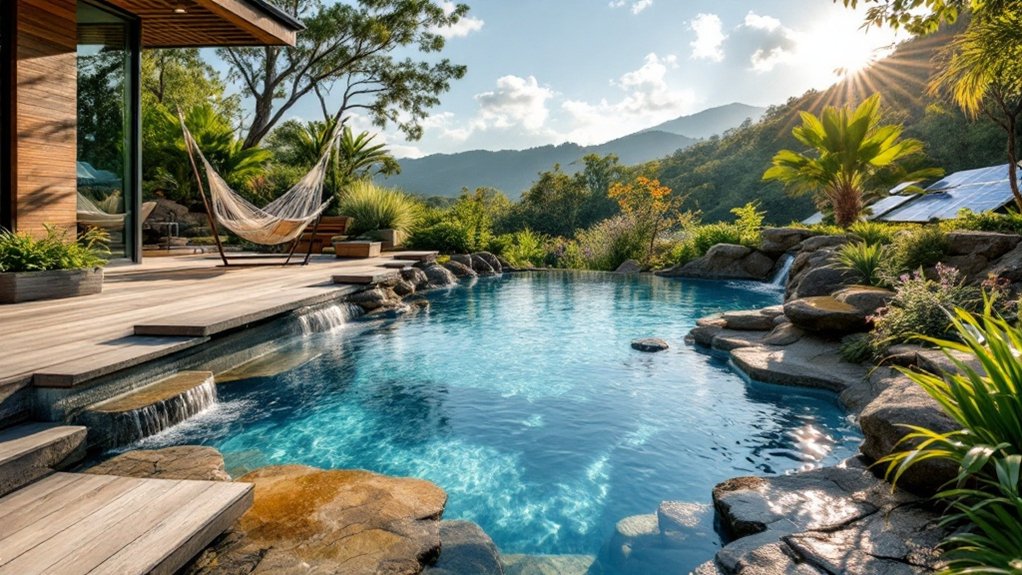Sustainable pool designs have emerged as a practical solution for homeowners concerned about their environmental impact. By integrating energy-efficient technologies and eco-friendly materials, these pools offer both luxury and responsibility. Water conservation techniques further enhance their sustainability. As more people seek to create serene outdoor spaces without compromising on their values, the exploration of innovative design features and alternative pool types becomes increasingly relevant. What possibilities lie ahead for eco-conscious pool owners?
Benefits of Sustainable Pools
The allure of sustainable pools lies in their myriad benefits, which extend beyond mere aesthetics. These pools greatly reduce water consumption through advanced filtration systems and efficient circulation, promoting conservation in resource management. Furthermore, they often utilize energy-efficient heating options, leading to lower utility bills and a reduced carbon footprint. The integration of native landscaping around these pools enhances biodiversity, providing habitat for local wildlife while minimizing the need for chemical treatments. Additionally, sustainable pools contribute to improved air quality and promote healthier ecosystems. Homeowners also experience increased property value, as eco-friendly features are increasingly sought after in real estate markets. Overall, the benefits of sustainable pools encompass environmental, economic, and health advantages that appeal to conscientious homeowners. Moreover, regular pool maintenance and inspections are crucial for ensuring that these sustainable features continue to operate efficiently over time.
Innovative Eco-Friendly Materials
Innovative eco-friendly materials play an essential role in sustainable pool designs. Recycled building materials and natural stone alternatives are leading the way in reducing environmental impact while enhancing aesthetic appeal. By incorporating these materials, pool builders can create beautiful and responsible outdoor spaces.
Recycled Building Materials
While many pool designs emphasize aesthetics, incorporating recycled building materials can greatly enhance sustainability without sacrificing style. Homeowners increasingly opt for materials such as reclaimed wood, recycled glass, and repurposed concrete to construct their pools and surrounding areas. These materials not only reduce waste but also offer unique textures and colors, contributing to a distinctive look. For instance, recycled glass tiles can create stunning mosaics, while reclaimed wood decking provides a warm and inviting atmosphere. Additionally, using these eco-friendly options can lower the overall carbon footprint of the pool project. As eco-conscious choices gain popularity, integrating recycled building materials stands out as an effective strategy for creating beautiful, sustainable pool environments that align with the values of environmentally aware homeowners.
Natural Stone Alternatives
As homeowners seek sustainable options for their pool designs, natural stone alternatives are emerging as a popular choice. These materials offer the aesthetic appeal of traditional stone while minimizing environmental impact. Options such as manufactured stone, which uses recycled materials, provide durability and versatility without depleting natural resources. Additionally, products like permeable pavers made from reclaimed aggregates allow for better water drainage and reduce runoff, promoting eco-friendly landscaping. Other alternatives include bamboo composites and recycled glass tiles, both of which add unique textures and colors to pool areas. By choosing these innovative materials, homeowners can create stunning pool environments that align with their commitment to sustainability and environmental stewardship.
Energy-Efficient Pool Technologies
Energy-efficient pool technologies have revolutionized the way homeowners approach pool maintenance and operation. These innovations greatly reduce energy consumption while enhancing the overall swimming experience. Modern variable-speed pumps are a prime example, allowing users to adjust flow rates to suit specific tasks, thereby saving energy compared to traditional single-speed options. Solar pool heaters harness renewable energy, providing warm water without relying on fossil fuels. Additionally, LED lighting systems consume minimal electricity and have a longer lifespan than conventional bulbs, further contributing to energy savings. Automated pool covers not only retain heat but also minimize evaporation, reducing the need for constant heating and chemical replenishment. Together, these technologies promote eco-friendliness while ensuring that pools remain enjoyable and functional for homeowners. Regular maintenance of heater fan motors is also essential to keep these systems running efficiently and prolong their lifespan.
Water Conservation Techniques
Water conservation techniques are essential for sustainable pool designs, focusing on methods that minimize water usage. Implementing rainwater harvesting systems allows pools to utilize natural precipitation, while efficient filtration methods reduce water loss during maintenance. Together, these strategies promote responsible water management in pool ownership.
Rainwater Harvesting Systems
While many homeowners seek to enhance their pools with sustainable features, integrating rainwater harvesting systems stands out as a practical water conservation technique. These systems collect and store rainwater from rooftops and other surfaces, markedly reducing reliance on municipal water supplies for pool maintenance. By diverting runoff into storage tanks, homeowners can utilize this natural resource for filling pools, maintaining water levels, or even irrigation. This approach not only conserves water but also mitigates stormwater runoff, which can lead to erosion and water pollution. Additionally, the installation of rainwater harvesting systems can be tailored to fit various home designs, making them a versatile option for eco-conscious individuals looking to minimize their environmental impact while enjoying their backyard oasis.
Efficient Filtration Methods
As homeowners aim for sustainable pool designs, employing efficient filtration methods becomes essential for minimizing water waste and maintaining clean pool environments. Advanced filtration systems, such as sand, cartridge, or diatomaceous earth filters, offer effective solutions while using less water than traditional methods. Additionally, incorporating regenerative filtration systems can further enhance water quality by utilizing natural processes to filter and purify pool water. Regular maintenance of filtration systems guarantees peak performance, reducing the need for frequent backwashing and excessive water loss. Homeowners can also explore options like pool covers, which not only retain heat but also reduce debris, thereby lessening the burden on filtration systems. By prioritizing these efficient methods, homeowners contribute to a more sustainable and eco-friendly pool experience.
Design Features That Blend With Nature
Incorporating design features that blend seamlessly with nature enhances the overall aesthetic and environmental harmony of a pool. Natural stone materials, such as slate or flagstone, can create a rustic appearance while providing durability. Integrating lush landscaping around the pool area, including native plants, not only enhances visual appeal but also supports local ecosystems. Water features, such as waterfalls or fountains, can mimic natural settings, creating soothing sounds and promoting relaxation. Additionally, using natural shapes and curves in pool design rather than rigid geometric lines can evoke a more organic feel. Incorporating shaded areas with pergolas or natural canopies further connects the pool to its surroundings, fostering a tranquil retreat that encourages eco-conscious living. Furthermore, considering landscaping that complements the pool design can enhance the integration of the pool within its environment.
Alternative Pool Types for Sustainability
Exploring alternative pool types can greatly enhance sustainability in residential and commercial settings. Natural swimming pools, which utilize biological filtration systems instead of chemicals, offer a chemical-free swimming experience while promoting biodiversity. Another option is the plunge pool, which requires less water and space, making it ideal for smaller yards. Additionally, geothermal pools harness the earth’s natural heat, providing efficient temperature regulation and reducing energy costs. Prefabricated pools, made from recycled materials, also contribute to sustainability by minimizing waste during construction. Finally, solar-heated pools utilize renewable energy sources, further decreasing their environmental impact. By considering these alternative pool types, homeowners can create enjoyable aquatic spaces that align with eco-conscious values and environmental stewardship.
Maintenance Tips for Eco-Conscious Pools
Maintaining eco-conscious pools requires a thoughtful approach that aligns with sustainable practices. Regularly checking and balancing water chemistry minimizes the need for harsh chemicals, promoting environmental health. Homeowners are encouraged to use natural alternatives, such as vinegar or baking soda, for cleaning purposes. Regular skimming and vacuuming can reduce the reliance on automated cleaning systems that consume energy. Additionally, implementing a solar pool cover can help retain heat, reducing energy consumption. Rainwater collection systems can also be integrated for pool water top-ups, conserving municipal water resources. Finally, scheduling routine maintenance with professionals who specialize in eco-friendly practices guarantees the longevity and sustainability of the pool without compromising environmental values. By following these tips, homeowners can enjoy their pools while respecting the planet. Furthermore, regular pipe cleaning can improve water quality and enhance equipment efficiency, ensuring a safe swimming environment.
Frequently Asked Questions
What Is the Initial Cost Difference for Sustainable Pools?
The initial cost difference for sustainable pools often varies considerably, with higher upfront investments due to eco-friendly materials and technologies. However, long-term savings on maintenance and energy can offset these early expenses for homeowners.
How Can I Finance a Sustainable Pool Project?
To finance a sustainable pool project, individuals can explore options such as personal loans, home equity lines of credit, or green financing programs. Grants and incentives from local governments may also assist in offsetting costs.
Are Sustainable Pools Suitable for All Climates?
Sustainable pools can be adapted for various climates; however, their effectiveness largely depends on local weather conditions, water availability, and maintenance practices. Each region’s specific environmental factors influence the feasibility and efficiency of sustainable pool designs.
What Permits Are Required for Eco-Friendly Pool Installations?
The required permits for eco-friendly pool installations vary by location. Typically, homeowners must obtain building permits, environmental assessments, and sometimes zoning approvals, ensuring compliance with local regulations and promoting responsible construction practices for sustainable developments.
How Does Pool Size Affect Sustainability?
Pool size considerably influences sustainability by determining water usage, energy consumption for heating and filtration, and chemical requirements. Larger pools often necessitate more resources, while smaller pools can enhance efficiency and reduce environmental impact overall.
Conclusion
To sum up, sustainable pool designs offer eco-conscious homeowners a remarkable opportunity to enjoy luxury while prioritizing environmental stewardship. By integrating innovative materials, energy-efficient technologies, and water conservation techniques, these pools create serene outdoor spaces that harmonize with nature. The thoughtful design features not only enhance biodiversity but also promote a sustainable lifestyle. Ultimately, embracing these eco-friendly choices allows homeowners to indulge in relaxation and leisure while contributing positively to the planet’s health and future.




